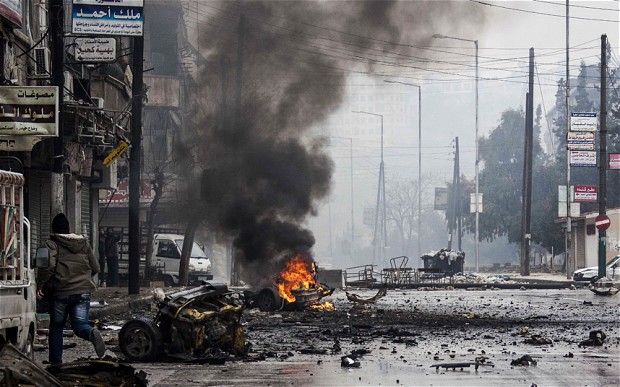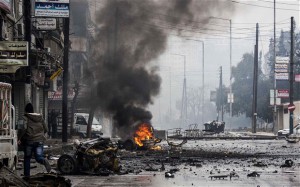Syria strike set to hijack G20 agenda

 World leaders from G20 will meet in St Petersburg, Russia, amid sharp differences over possible US military action against Syria, in response to what the US administration calls a deadly chemical weapons attack.Yesterday’s summit comes hours after a US Senate panel voted to give President Barack Obama authority to use military force against Syria — the first time lawmakers have voted to allow military action since the October 2002 votes authorising the invasion of Iraq.
World leaders from G20 will meet in St Petersburg, Russia, amid sharp differences over possible US military action against Syria, in response to what the US administration calls a deadly chemical weapons attack.Yesterday’s summit comes hours after a US Senate panel voted to give President Barack Obama authority to use military force against Syria — the first time lawmakers have voted to allow military action since the October 2002 votes authorising the invasion of Iraq.
Washington and Syria’s main backer, Russia, remained publicly at odds as Obama tried to build his case for military action, saying he would continue to try to persuade Russian President Vladimir Putin of the need for punitive strikes on President Bashar al-Assad for using chemical weapons when the two meet in St Petersburg.
In Stockholm en route to Russia, Obama said the credibility of United States and of the world was at stake.
Putin again questioned Western evidence. He accused Kerry outright of lying when, in urging Congress to approve strikes on Syria, Kerry played down the role of al-Qaeda in the rebel forces.
“Al-Qaeda units are the main military echelon, and they know this,” Putin said.
“He is lying and knows he is lying. It’s sad.”
Putin said US congressional approval without a UN Security Council resolution would be an act of aggression.
Putin also said this week that any one-sided action would be rash. But he said he does not exclude supporting UN action — if it is proven that the Syrian government used poison gas on its own people.
The measure, which cleared the Senate Foreign Relations Committee on a 10-7 vote, was altered at the last minute to support “decisive changes to the present military balance of power” in Syria’s civil war, though it ruled out US combat operations on the ground. It was expected to reach the full Senate floor next week.
The Syria conflict, which began with a popular uprising in March 2011, has been stalemated, and it is not clear if US military strikes over the government’s alleged chemical weapons use would change that. Obama has said he seeks limited pinpoint action to deter future chemical attacks, not regime change.
Meanwhile, China has warned other world powers of global economic risks following the potential US strikes on Syria.
Chinese Vice Finance Minister Zhu Guangyao said such “military action would definitely have a negative impact on the global economy, especially on the oil price.”
He spoke in St Petersburg yesterday ahead of the G20 summit.
He cited estimates that a $10 rise in oil prices could push down global growth by 0,25 percent.
He urged a negotiated UN solution to the standoff over allegations that Syria’s government used chemical weapons against its own people,
expressing hope that “the world economic balance will become more stable rather than more complex and more challenging.”
Russia has also issued a warning that US strikes on Syria’s atomic facilities might result in a nuclear catastrophe and is urging the UN to present a risk analysis of such a scenario.
The warning comes from Russia’s Foreign Ministry spokesman, Alexander Lukashevich. He said in a statement on Wednesday that a strike on a miniature reactor near Damascus or other nuclear installations could contaminate the region with radioactivity, adding: “The consequences could be catastrophic.”
IAEA spokeswoman Gill Tudor told the AP in an email Thursday that her agency is ready to “consider the questions raised” by Lukashevich if it receives a formal request to do so from Moscow.
Russia’s Interfax news agency says that Moscow intends to bring up the issue at next week’s 35-nation IAEA board meeting.
Obama has been lobbying for international and domestic support for punishing Assad’s regime, which the US says fired rockets loaded with the nerve agent sarin on rebel-held areas near Damascus before dawn on 21 August, killing hundreds of civilians.
So far, however, he has won little international backing for action. Among major allies, only France has offered publicly to join the US in a strike.
In a parliament debate, France’s Prime Minister Jean-Marc Ayrault made a passionate appeal for intervention in Syria, placing the blame for the alleged chemical attack on Assad and warning that inaction could let him carry out more atrocities.
The debate ended without a vote since President Francois Hollande can order a military operation without one.
Obama has called chemical weapons use a “red line,” and top administration officials argued before the Senate on Tuesday that Assad would take inaction by Washington as a license for further brutality against his people. The fighting has killed more than 100 000 Syrians and uprooted nearly seven million from their homes.
The civil war in Syria hit a stalemate almost from the start. The rebels control much of the countryside in the north, east and south, but the regime is hanging on to most urban centres in the west, where the majority of Syrians live.
Within that deadlock, each side has consolidated control over certain areas, said Peter Harling, a Syria expert at the International Crisis Group think-tank.









Comments